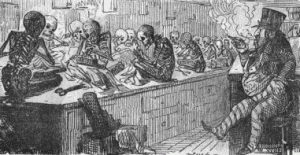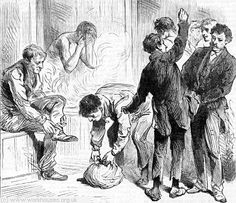Victorian London was quite lonely for plenty of people. So lonely, that in fact, depression claimed many lives. Lee Jackson’s “Dirty Old London” website cites sections and sections of catalogued suicides. Even in a city overfilling with people, plenty were lonely and depressed. The victorian era has a lot to teach us in terms of social isolation and the impacts on the mental state of mind. In the world we currently exist in so dependent on technology it is easy to forget that the problems we now face aren’t any different than the ones we use too. A example of suicide in victorian text shared by Jackson speaks to the lonely epidemic spread throughout London, describing it as
“‘Alone in London,’ in a modified sense, is a phrase that would describe tens of thousands. The married men amongst them might, or might not, be mourned by their families, if they did not come home, or were brought home dead, at night: under similar circumstances, laundresses and landladies, and their slaveys, might pump up a tear for the bachelors, and then begin at once to provide for the next tenant of the chambers or lodgings.”(Episodes in an Obscure Life; Richard Rowe, 1871 XXI)
The lonely were expected to off themselves, in a sense. The overworked could be dead, and in a nonchalant way this was expected. The tone is present in other victorian pieces regarding suicide from Jackson’s web page. The stories are the same as they are now, evident in the example section of the webpage, where the story of a heartbroken 19 year old girl is described her grandfather in the hours before her suicide as her grandfather remembers, ” He had no knowledge of her condition. He had often heard her say of late “She wished she was out of the way,” but he did not ask why, nor did she voluntarily assign any reason for her wish.” (The Times, February 20 1890). The fear of not speaking up at the right time or making a mistake and feeling guilt through this is not observed in just victorian London, but also in a modern setting.
-Maisie Miller online assignment #1

